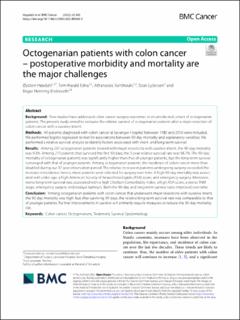| dc.description.abstract | Background Few studies have addressed colon cancer surgery outcomes in an unselected cohort of octogenarian patients. The present study aimed to evaluate the relative survival of octogenarian patients after a major resection of colon cancer with a curative intent. Methods All patients diagnosed with colon cancer at Levanger Hospital between 1980 and 2016 were included. We performed logistic regression to test for associations between 90-day mortality and explanatory variables. We performed a relative survival analysis to identify factors associated with short- and long-term survival. Results Among 237 octogenarian patients treated with major resections with curative intent, the 90-day mortality was 9.3%. Among 215 patients that survived the first 90 days, the 5 year relative survival rate was 98.7%. The 90-day mortality of octogenarian patients was significantly higher than that of younger patients, but the long-term survival converged with that of younger patients. Among octogenarian patients, the incidence of colon cancer more than doubled during our 37-year observation period. The relative increase in patients undergoing surgery exceeded the increase in incidence; hence, more patients were selected for surgery over time. A high 90-day mortality was associated with older age, a high American Society of Anaesthesiologists (ASA) score, and emergency surgery. Moreover, worse long-term survival was associated with a high Charlson Comorbidity Index, a high ASA score, a worse TNM stage, emergency surgery and residual tumours. Both the 90-day and long-term survival rates improved over time. Conclusion Among octogenarian patients with colon cancer that underwent major resections with curative intent, the 90-day mortality was high, but after surviving 90 days, the relative long-term survival rate was comparable to that of younger patients. Further improvements in survival will primarily require measures to reduce the 90-day mortality risk. | en_US |

